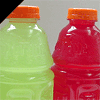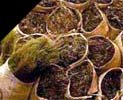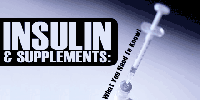Sport drinks are used as an easily available source of rehydration in the United States for both athletes and the general consumer.
They are widely perceived to have targeted benefits but they also have major ingredients which may work at counter-purposes for many individuals. Therefore, that which is intended to assist the body in meeting a need, may actually contribute negatively to its overall functioning.

 What Do Major Sport Drinks Contain?
What Do Major Sport Drinks Contain? What Are These Ingredients?
What Are These Ingredients?
| Sport Drink No. 1 | ||||||||||||||||||||||
|
| Sport Drink No. 2 | ||||||||||||||||||||||||||||||||||
|

 What Do Sugars Do In The Body?
What Do Sugars Do In The Body?

- When simple sugars such as glucose, fructose and sucrose are taken into the body, they rapidly enter the bloodstream. In high concentrations, these sugar molecules can draw fluids away from the tissues of the body, contributing to dehydration.
It also ultimately can take a lot of water to metabolize and eliminate salts and sugars from the body once they are consumed, also resulting in water loss and dehydration.
Sugars enter the cells of the body where they are metabolized for quick energy. The sugar has a metabolic effect on insulin. Over time excess consumption of sugars may lead to permanent alterations in metabolism and the reaction of cells to sugars, contributing to the development of diabetes.
 |
||||
 |
|
 |
||
 |
||||
- Sugars can give a rapid "energy high" but do not provide the best sustainable source of longer term support for the body.
Our taste buds are programmed to respond to sugar in a strongly positive way. Sweet tastes are not very common in nature, so humans have developed the ability to detect sweet-tasting foods. In the modern world, we are surrounded by sweeteners.
Honey is one natural sweet-tasting food found in nature. It is a complex mixture of sugars, vitamins and minerals that is metabolized differently than simple sugars and provides many documented health benefits for the immune system and for cells and tissues through antioxidant effects.

 What Do Hydrogenated Fats Do To The Body?
What Do Hydrogenated Fats Do To The Body? 
- High risk factor for heart disease.

 What Do Salts Do In The Body?
What Do Salts Do In The Body?
- Salts are combinations of electrolytes such as sodium, potassium and chloride. They are critical for the functions of cells and a proper balance of electrolytes is necessary for proper performance of the heart, muscles and other organs.
 |
Electrolytes An electrolyte is a substance which dissociates free ions when dissolved (or molten), to produce an electrically conductive medium. Because they generally consist of ions in solution, electrolytes are also known as ionic solutes. They are sometimes referred to in abbreviated jargon as lytes. Electrolytes generally exist as acids, bases or salts. |
 |
 |
||
When we lose water through perspiration during physical exercise, we also lose salts. Therefore, it is important to replace salts as well as water for healthy rehydration.
The concentration of salts in the body fluids is much lower than in sea water for example, or in many salty foods. Therefore many dietary sources of salts result in excess salts coming into the body. To eliminate excess salt the body must also lose water to carry the salts away.

 Artificial Dyes
Artificial Dyes
- Artificial dyes are often placed in beverages to provide color to colorless beverages, or to mask unpleasant colors.
As artificial additives, many of these dyes have been tested for the ability to cause cancer in laboratory animals.

 Natural Sources vs. Synthetic Chemicals
Natural Sources vs. Synthetic Chemicals
- Nutrients should come from nature. Many vitamins, minerals and electrolytes are added to various foods and beverages in synthetic form. The digestive and metabolic effects of synthetic chemicals are not always the same as with natural sources.
The body responds best to nutrients obtained from natural food sources, and is well designed to respond to and utilize nutrients present in plants.

 Natural Sources of Hydration
Natural Sources of Hydration
- Pure water - Body able to obtain clear fluids & cleanse. Does not establish electrolyte replacement.
- Natural minerals - Natural minerals found in different plant species can be added to a pure water source by infusion of the plant into the water
- Rooibos - African for Red Bush, 100% pure Aspalathus Linearis grown only in South Africa, used to establish electrolytes in the body. It contains the antioxidants of green teas, is naturally caffeine free, has no oxalic acid & .044% tannic acid (traces that are natural in many food sources).
Rooibos is in the legume family (bean), classified as a food. Rooibos is not a tea or an herb and there is no limit to daily consumption.
Water
- Many different
- sources are available globally. Pure well water & natural spring water are the ultimate choices. It is important to make sure that waters are lab tested.
Much research has been done on many bottled water sources. The FDA has many rules and regulations set for bottled water companies prior to bottling the water. Sunn recommends that the consumer research these standards.
Plant Minerals
- There are a number of natural minerals that are available in pure forms that can be blended together and added to preferably pure water sources.
These minerals will then help replenish the body with needed electrolytes. It is always preferred if adding minerals to your water source to obtain Natural vs. Synthetic.
Rooibos

- Rooibos (Afrikaans for "red bush") contains no sugars, artificial dyes or additives of any kind. It is 100% pure and natural. It naturally contains physiologic levels (naturally occurring levels in plants and animals) of the important electrolytes sodium and
- , and the important minerals
- , copper,
- ,
- and
- .
Compared to the leading sport drinks, rooibos has lower sodium and potassium in one serving; therefore consumption "throughout the day" provides physiologic levels from natural plant sources, without the risk of overloading on salt. Too much salt will be dehydrating.
Sports Drink #2 has B vitamins, while rooibos does not; however rooibos has many antioxidants which cover that function of B vitamins. B vitamins have other functions not provided by rooibos. However, too much B vitamins may cause problems - so it may not be taken in unlimited quantities without the potential risk of getting an overdose of B vitamins, which carries various unpleasant and possibly dangerous side effects.
Due to its properties, rooibos has become a very popular fluid replacement for athletes in South Africa, where rooibos is grown. All below minerals contribute to healthy fluid and electrolyte balance.
| Minerals Contained In Rooibos | |||||||||||||||||||||||||||
|

